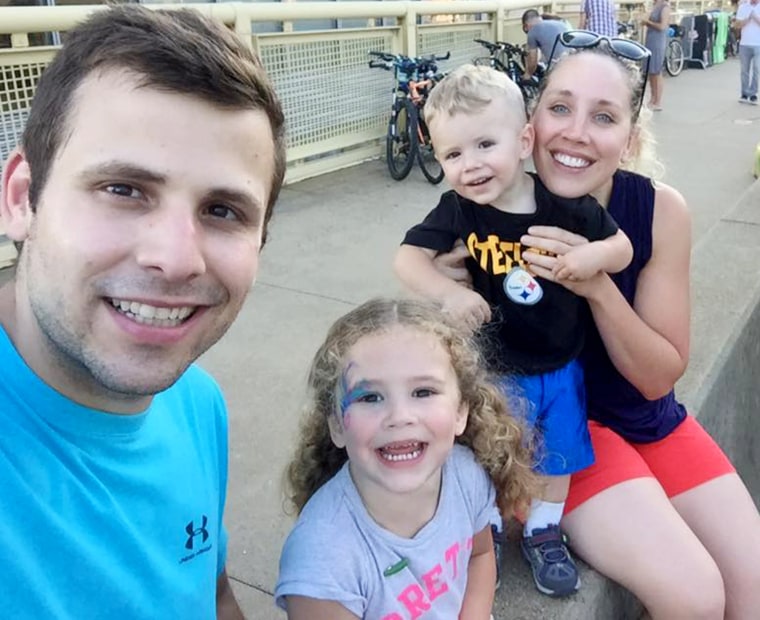When Andrea Metti was in labor with her daughter Maggie, the young mother's vitals faltered as she went into distress. During the pregnancy, Metti had a rare and dangerous type of preeclampsia that can be fatal to mothers and babies. Doctors had to quickly deliver the baby to save Metti's life.
During the delivery, Metti was given an episiotomy, an incision in her vaginal opening, to help speed up the baby's arrival. She felt a quick sharp burning pain and then soon after, her baby girl Maggie was born.

“They didn’t even numb the area or tell me it was going to happen,” Metti, 35, of Pittsburgh, told TODAY. "But my health was in a pretty rough state. I was so glad that they did everything they could to save her."
Metti had a tear from her vagina to her anus, which required 56 internal and external stitches to repair. When she went to her six-week check-up, her midwife looked at Metti and knew the new mom wasn’t healed.
“The midwife actually told me that I looked like ground meat and told me she was going to give it another six weeks,” she explains. “I wasn’t medically cleared.”
By 12 weeks, the midwife said Metti could exercise, have sex and return to her normal activities. But over the next year, the mother of three couldn’t sit for too long without pain. Sex was nearly impossible because it always hurt. Even wearing tight clothes or sweating caused discomfort.
“It would just hurt. There was nothing much that I could do,” she said. “I was told that everything was healed, but it was a feeling of being uncomfortable.”
From incisions to tearing.
Incisions or tearing during childbirth may be one of the least talked about causes of pain during sex for younger women.
About 75% of women require some stitches immediately after childbirth, said OB-GYN Dr. John Fisch of the UPMC in Pittsburgh. About 20% of women who receive stitches experience painful sex for six months after delivery. In some rare cases, the pain lasts longer.
"There is more potential pain with intercourse," Fisch told TODAY. "I would say it is fairly common. It all depends on how things heal."
In 2006, the American College of Obstetricians and Gynecologists urged doctors to perform episiotomies only when medically necessary. At that time, about 25% of vaginal births involved an episiotomy, according to a 2012 study. That was down from a high of 61% in the 1970s. Doctors mistakenly believed an incision in the perineum, the area between the vulva and anus, helped women deliver and heal faster.
“The routine use of episiotomies really provided no immediate or long-term benefits,” Dr. Mark Turrentine, chair of ACOG's Committee on Practice Bulletins-Obstetrics, told TODAY.
Since then, the number has dropped to 11.6%. But it is higher at some hospitals, often in rural areas or with older doctors, said Fisch, division director for Women Care Associates at Magee-Women’s Hospital.
“It was felt at that time by cutting an episiotomy you would reduce trauma to the perineum and have a clean cut to sew,” said Fisch.
But doctors noticed episiotomies created more damage.
“Episiotomy actually increased your risk of more significant tears, specifically third and fourth degree tears. That is a tear into the muscle of the rectum and through the rectum,” said Fisch.
This creates lingering pain, like Metti experienced, and can also cause rectal incontinence.
“That’s lifelong. The surgery to fix it is difficult and not necessarily successful,” Fisch said.
When women tear naturally, they tend to experience less serious injuries.
“You can still have bad tears, but it is more common to see it after the episiotomy,” Fisch said. “We have seen a big drop in our third and fourth degree tears.”
Turrentine said doctors do still need to perform episiotomies when mom or baby is in distress.
“It can be a situation where there is some reason that the baby needs to be delivered immediately and maternal efforts cannot expedite it,” he explained.
Speak up.
Yet even with natural tearing, women still experience complications and pain.
“I do wish I had thought about talking to a doctor sooner.”
After DeLaura DeMarco-Logue delivered her son, Indio, via a vaginal birth after a C-section, she tore and received stitches. At her six-week appointment, her doctor said she was healed and cleared her for all activities. But over the next two years, she experienced pain during sex. In certain positions, she’d cry because it hurt so intensely. But she dismissed it, thinking her body had changed or she wasn’t in the mood.
“It was amazingly painful,” the 39-year-old from Indian Harbor Beach, Florida, told TODAY. “We had no idea what was going on.”
DeMarco-Logue didn’t seek help until she experienced a mishap with a menstrual cup. She felt excruciating pain and realized the cup was poking out of a new hole. After an exam, her doctor explained she likely lost a stitch and that area never healed closed.
“It was just never looked at after the original six-week exam,” she said. “I had a misconception of what the stitches were.”
DeMarco-Logue had a procedure where doctors created a new incision and sewed it up, closing the extra opening.
“My life has gotten so much better,” she said. “I do wish I had thought about talking to a doctor sooner.”
Fisch said “potential pain with intercourse” is “fairly common” after a woman receives stitches from delivery. He urged women to talk to their doctor if they are experiencing anything that seems abnormal.
Metti wished she knew to ask for help, too. After having her second child, a doctor recommended pelvic floor physical therapy, which helped eliminate her pain.
“That help resolved all of the pain. I wish somebody would have told me about that sooner,” she said.

